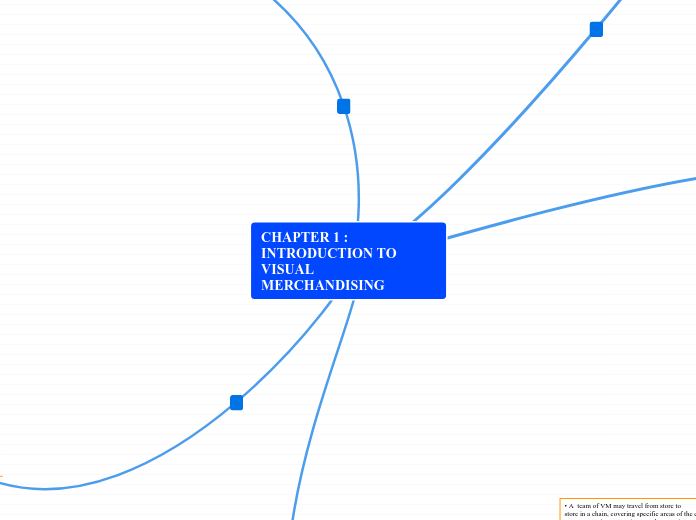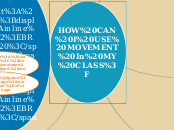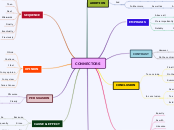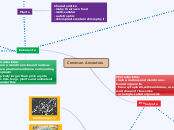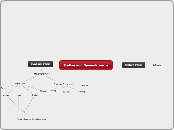ROLE
Dresser Visual Merchandiser
•To maintain retail standards
• To be aware of fashion trends
• To work closely with shop-floor staff to ensure visual guidelines are met
• To understand and be aware of brands
• To present merchandise both creatively and with the maximization of sales in mind
Visual Merchandise Manager
• To manage a team
• To liaise a team
• To communicate with the senior VM manager
• To design and implement in-store and windows displays
• To interact with the graphics team
• To liaise with floor managers
• To know competitors
• To communicate with brands
Definition of The VM
In the conclusion you should have a brief summary of your key points.
Final Point
Emphasize how you managed to defend your main idea and goals along the essay.
To gets customers attention to the store
Decoration in store in a way that reflects the positive image of the store
A profession that involves displaying merchandise and
MERCHANDISING
Marketing practise where the
brand/image from one
product/service is used to
sell another
VISUAL
Referred to the sense
of sight/look
Elements of VM
Signage and graphics
• Can vary in in form and sizes based on location
• It will be the first impression that many customers have
• Should be neat and bright and show the brands and standards of the store
Color
• Can vary in in form and sizes based on location
• It will be the first impression that many customers have
• Should be neat and bright and show the brands and standards of the
store
Lighting
• Can be used to enhance window display
• Can be used in many ways in retail stores
• Natural day light used at night reflect the
merchandise appearance
• Most important part of displays
• It displays required emphasis on certain product
Mannequins
• Are used by apparel retailers to display their products.
• Tools used to show customers what their product look like on a person
• Displays have to grab shoppers attention
• Used to highlight the unique collections of the store
• Display the latest trends in fashion and influence the customer to buy
• Attract customers into the store and increase the sales
Materials And Props
• Should consider what material and props suitable with the
merchandise in display
• Props can be dramatic, fun, charming
• Anything can be a props ; a basket of bread, photo of kids on the
beach, dried flowers, a chair, garden tools and many more
• The mission is to create excitement and grab attention
Merchandise
• show the new arrival items or promotional items and
combine nicely the merchandise together to attract
customers.
• As super strong and buff
• First communicate with customers through visual
merchandising
• Used as one of the methods to showcase merchandise
• Numerous methods to promote a brand
Recognize VM in retailing
Small Retail Outlets
• Smaller independent shop enlists the help of a self-employed VM (often called freelancers) to help promote their merchandise.
• Freelancers usually change the look and atmosphere of a store in a matter of hours.
• Freelancers are usually fast and efficient because they generally work in project-fee basis.
• A freelancer may specialize in designing windows or in-store visual merchandising or may offer both service.
• Smaller independent stores may enlist the help of self-employed visual merchandiser to help promote their merchandise
• Freelancer can change the look and atmosphere of a store in a matter of hours
• Most of creative individuals have trained within a established and renowned visual team
• Some may specialize in fashion styling, while others may excel at product grouping
• It is always best to ask to see freelancers’ portfolios before engaging them as these will contain examples of their work
Multiple Chain Stores
• Many high-street multiple chain stores have creative team to design, plan and organize their windows displays
• High-street chains will have a similar visual merchandising structure to that of a department store
• One VM or a team of visual merchandiser may travel from store to store in a chain
• Visual merchandiser in a multiple chain will be recruited through a firm’s head office
Department Store
• A team of VM may travel from store to
store in a chain, covering specific areas of the country.
• For any major promotions, such as Hari Raya and sales, visual merchandisers will make the plan on visual merchandising of all chain stores.
• A VM will design and plan the installation of windows and in-store visual merchandising projects for the entire chain.
• VM role is communicating visual strategy to each of the stores managers and store staff.
• VM should ordered and monitored signage and price tags.
Principles of design
The key points are the arguments which will support your thesis. These can be agreeing arguments or disagreeing arguments too, in each case they need to reflect on the main idea.
Harmony
• Creating an area of attention.
• Pull the pieces of visual merchandising together.
be achieved through a repetition and rhythm.
• It is the combination of color that can
relate to and complement each other.
• It means all part of the visual image
• Pleasing effect of combinations
Rhythm
• Help lead your eye through a room.
v. Radiation : emphasis in middle; all radiates in centre
iv. Altenation : when certain shapes or color are used alternatively (light against dark colors, warm colors with cool colors)
iii. Repetition : multiples of the same shape or color
ii. Step or progression : progression of sizes or color (light to dark)
i. Pyramid/cylinder
• Create a sense of movement and can establish pattern and texture.
• Rhythms can be random, regular, flowing and progressive.
• Refers to the repetition of the elements in a design.
• Use of line, color and lighting
• From dominant object to subordinate object
• Movement from element to element
• Line direction, eye movement
Proportions
• Promote an idea or look (fragile vs weak)
iii. Consider the size of objects to be used in the window
ii. Consider the size of the space in the window
i. How do the elements relate?
• Its attracts attention
• Baby shoes next to huge teddy bear???
• Relationship of size, scale or weight.
• It is the relationship between the elements used in a design.
• Refers to the relative size and scale of the various element in design
Emphasis
• Without emphasis, your eye tends to wander and is never satiated
• Design that catches the viewer attention
• Dominance can be applied to one or more of the elements to give emphasis.
• Is the ability to attract attention and make an element stand out
• Making the element that is most important stand out in the design
• Its creates focal point in a design composition.
• Point of eye contact
Balance
There are 3 types ;
iii. Radial
ii. Asymmetrical
i. Symmetrical (identical on both sides)
• Like physic determine how weightened is to in certain area.
• Its provide stability and structure to a design.
• Different elements are equal
• Equal distribution of objects
CHAPTER 1 : INTRODUCTION TO VISUAL MERCHANDISING
Use this mind map structure to discover unseen connections, generate new ideas and reach a better understanding of any given subject.
